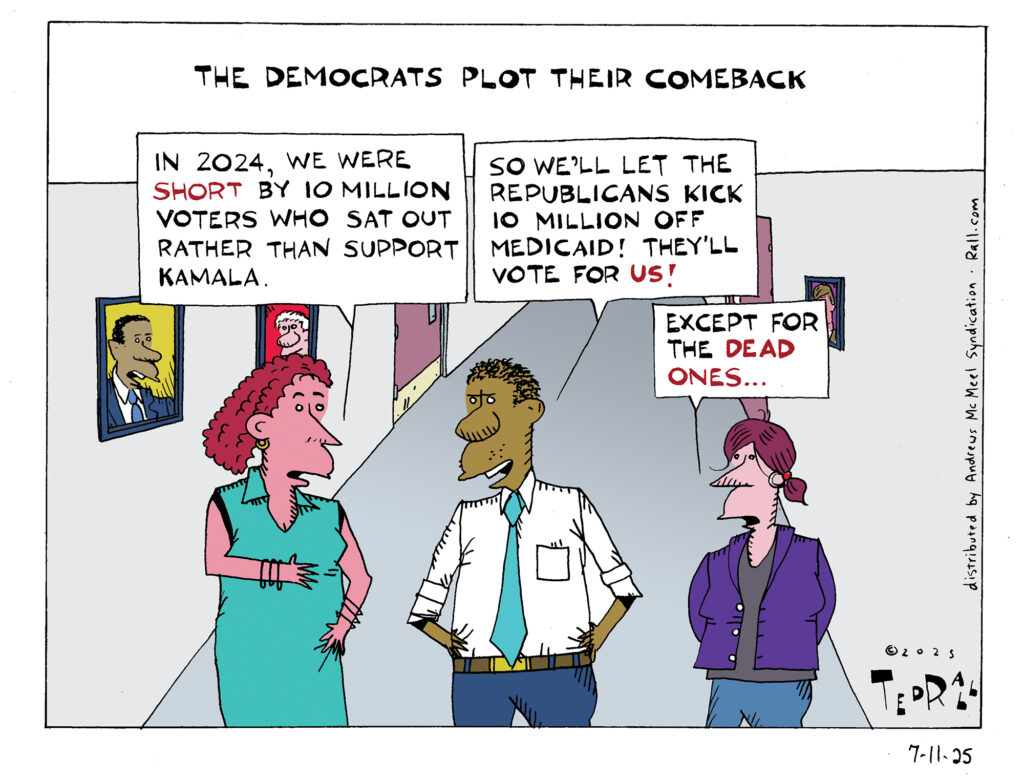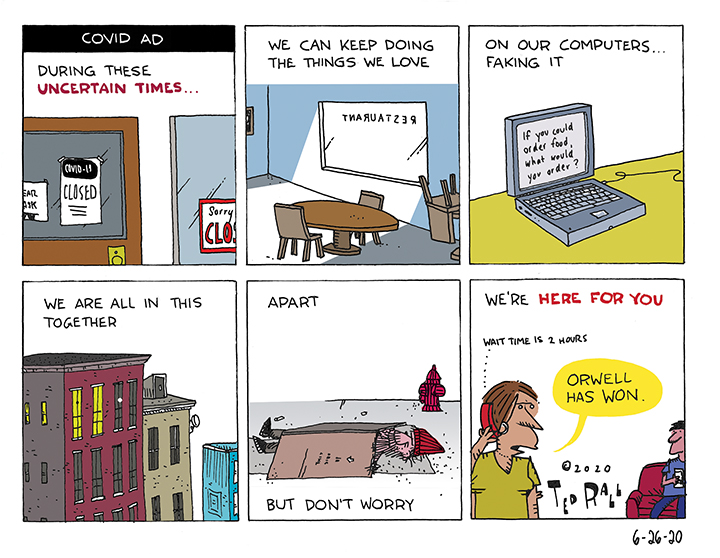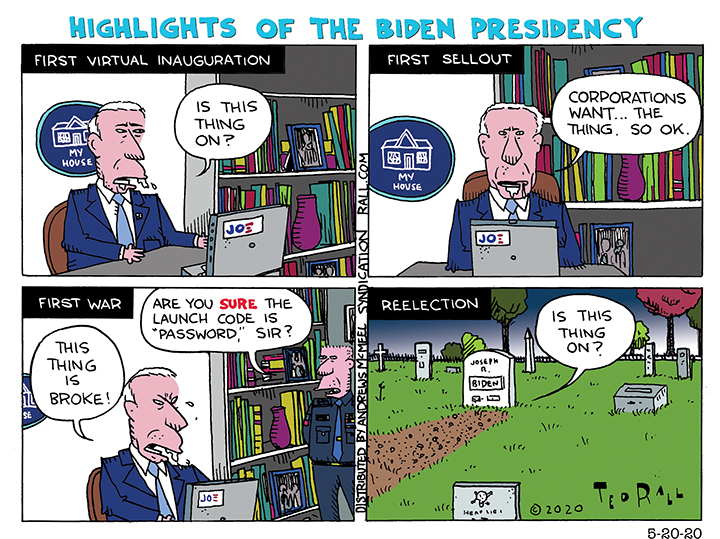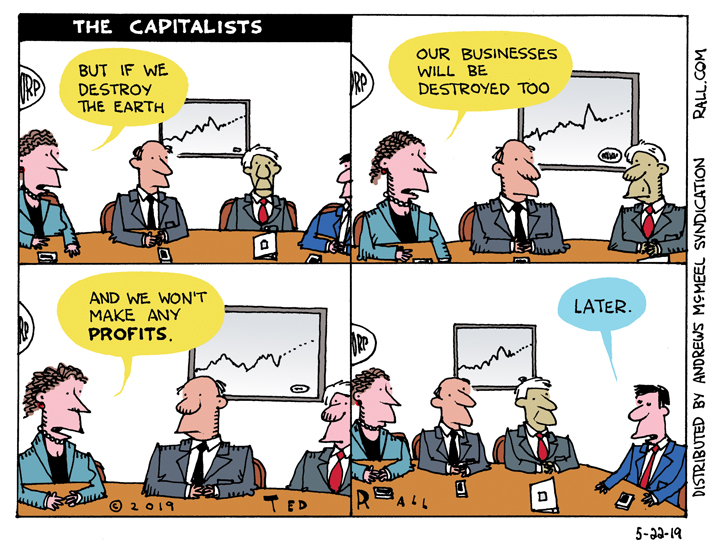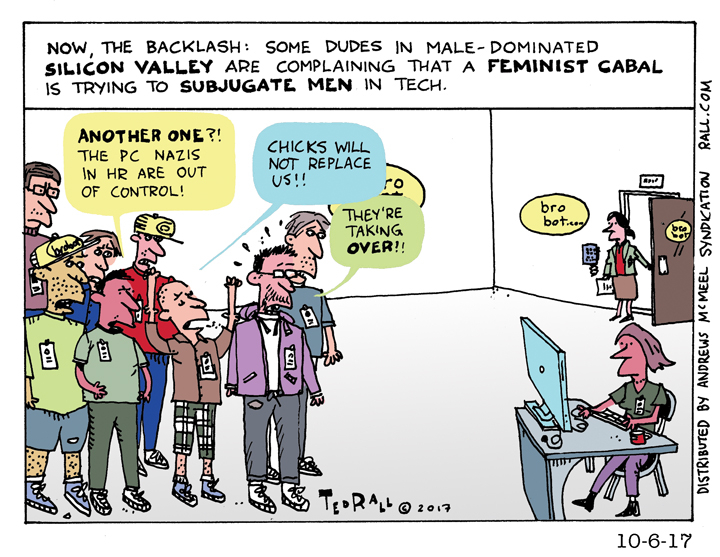The Republicans’ Big Beautiful Bill Act will cause at least 10 million Americans to lose their healthcare coverage due to sweeping budget cuts to slash taxes for corporations and wealthy individuals. That’s very close to the number of 2020 Biden voters who refused to turn out for Kamala Harris in 2024. Would they turn out for a Democrat in 2028 to express their displeasure? Not if the loss of healthcare has the desired effect.
DMZ America #81: Southwest Airlines, Mark Santos and Section 42
What’s to blame for mass cancellations and dysfunction at the formerly beloved Southwest Airlines? Long Island has a new Congressman-elect, Mark Santos. But nothing he told us about himself seems to be true. Ironically, his lies make him look worse than the reality of his hardscrabble upbringing. Supreme Court is allowing Section 42 to remain in place, trapping tens of thousands of asylum seekers at the Mexico border. Surely there’s a better way. Editorial cartoonists Scott Stantis and Ted Rall break it down for you.
SYNDICATED COLUMN: Call H.R.? Why Not the Cops? The Weird Politics of Sexual Harassment
 When the Kevin Spacey story first broke, he stood accused of one act of wrongdoing: aggressively hitting on a 14-year-old boy.
When the Kevin Spacey story first broke, he stood accused of one act of wrongdoing: aggressively hitting on a 14-year-old boy.
If true, this is wrong. Very wrong. Obviously. Adults shouldn’t proposition children. But this happened more than 30 years ago. The nature of the response — Netflix distanced itself from the star of its hit show “House of Cards” by announcing its previously secret decision to end the series next year — seems like the wrong response to the actor’s behavior…and one that has become all too typical.
Bear in mind, this was before other people stepped forward to say Spacey had sexually harassed them. Some of Spacey’s accusers worked on “House of Cards.” After that, Netflix would have been derelict not to put Spacey on hiatus as the accusations get sorted out, and to fire him for creating a toxic work environment for its current employees. Which is what it did.
Sexual harassers getting their just comeuppance is a good thing. It is decades, centuries, millennia overdue. What I can’t figure is, why is the knee-jerk response to these accusations, the standard-issue form of social shaming in the 21st century, to fire them from their jobs — including jobs where they didn’t do anything wrong?
The NYPD may file criminal charges against Harvey Weinstein, whose name will for the forseeable future be preceded by the phrase “disgraced Hollywood producer.” But Weinstein is an exception. For most men accused of sexual harassment and assault during this post-Weinstein outcry, the standard demand is: fire him!
Depriving a man (or woman, if that happens) of their livelihood in response to piggishness seems both too little and too much.
For victims, the knowledge that their attacker lost their job hardly rises to the level of even minimal justice. Nor does it protect other women from falling prey as well. Any sanction short of a prison term for a rapist or a big-time sexual harasser is bound to feel trivial, as though society doesn’t weigh victimhood, as if victims are disposable.
For the falsely accused (e.g., the University of Virginia, probably also the Columbia student accused by a famously mattress-toting classmate), being deprived of a livelihood for a crime they didn’t commit is egregious. We live in a capitalist society without a minimal safety net, so losing your job can — if you are unable to find a new one — quite literally kill you.
Unless the incident occurs on the job, the connection between employment and sexual harassment and rape is as arbitrary and odd as that between employment and healthcare. If a society determines that healthcare is important, it should be available to everyone, not just workers fortunate enough to land a 40-hour-a-week job working at a company big enough to offer a health plan. Similarly, what does sexually harassing 30-plus years ago at a private party — yes, even a boy — have to do with Spacey’s then-current gig with Netflix?
It didn’t turn out to be the case, but try to imagine that the entire brief against Spacey had never expanded beyond Anthony Rapp’s tweet, which describes an incident that Spacey claims he doesn’t recall. It’s safe to say Spacey’s character on “House of Cards” would have been killed off. Spacey probably would have lost other jobs. He would likely have had trouble finding work in the future. You might say good, who cares? But this outcome would have been fair neither to Rapp nor to Spacey.
If Rapp is telling the truth, it would be better for that truth to be determined by the courts, should he decide to file charges. Statues of limitation are challenging in these cases, but the solution is for state legislatures to fix that problem, and for prosecutors to be induced to go after cases tougher than a slamdunk. As it is, political leaders are abdicating justice to social media lynch mobs and employers. There are also civil courts, where the standard of proof is lower.
As far as Spacey goes, is it ethical to take money out of his pocket over an accusation that has never been tried, much less proven, by a judge or jury?
On the other side of the coin, Fox News waited way too long to fire Bill O’Reilly and Roger Ailes. I’m not typically sympathetic to corporations or their bottom lines, but if I’m the boss at a company, anyone who forces my organization to pay a multimillion-dollar settlement to a sexual harassment victim — because, let’s face it, corporations only pay when they’re guilty — is out the door before it happens again. Mark Halperin allegedly harassed women at ABC; ABC’s firing thus seems cut and dry.
Of the recent firings, NPR handled things better than most. Michael Oreskes hung on to his job as long as his accusers were out of his past, from his previous position at the New York Times. They let him go after a female NPR staffer said he’d harassed her.
These cases of sexual harassment and assault are more straightforward from a human-resources point of view: employers must not permit a hostile work environment. That requires them to fire harassers. But this does not go far enough. What of their victims? Is victims’ only recourse to sue in civil court, or try to get a book published? Here too, we need to adjust the criminal justice system to a post-“Mad Men” world that understands the toxic effects of workplace harassment. Bill O’Reilly probably misses his job, but he’s still rich and life goes on.
As I’ve written before, employers have way too much power over workers. While bosses have every right — and the duty — to fire those who abuse other employees at their current workplace, they shouldn’t be allowed to punish anyone for actions, no matter how heinous, that took place outside the workplace or at a previous job. Otherwise we wind up with insane politically-oriented censorship firings like the case of the neo-Nazi dude who never shared his views at his job at a pizzeria, yet got canned after he was photographed in Charlottesville, and the liberal woman whose marketing company employer let her go after she gave the finger to Trump’s motorcade — while biking, not at work.
Sexual harassers and assaulters should face prison time. So should false accusers. But bosses need to mind their own business — at their own business.
(Ted Rall (Twitter: @tedrall) is author of “Trump: A Graphic Biography,” an examination of the life of the Republican presidential nominee in comics form. You can support Ted’s hard-hitting political cartoons and columns and see his work first by sponsoring his work on Patreon.)
SYNDICATED COLUMN: What a Real Passenger Bill of Rights Should Look Like
The violent ejection of a United Airlines passenger from a flight bound from Chicago to Louisville appears to have marked a long-awaited turning point. Dr. David Dao, 69, suffered a broken nose, lost two teeth and faces reconstructive sinus surgery. At last, America’s long-suffering flying public is crying as one, have you commercial airlines no shame?
Americans have been mad as hell. Now, it seems, they’re not going to take it anymore.
How will the politics of protecting travelers from rapacious — and sometimes brutal — air carriers play out? With the Republicans in control of all three branches of government, will this moment pass without significant legislative action as did the mass school shooting in Newtown, Connecticut? Or will Trump’s Congress be forced to act?
Thanks to nickel-and-diming us with $30 baggage and seat fees, the airlines are raking in billions. So they can easily afford changes that benefit consumers but cost their bottom lines.
Even the IRS is more popular than the airlines. So politicians aren’t taking any risks by taking them on.
Now is the time to act. Consumer advocates should set a high bar for their demands — and insist that Democrats get behind them. Dems should be able partner with Republicans on this one; “airlines suck” is bipartisan.
What would a genuinely kickass passenger bill of rights look like?
Americans sometimes point to Europe as an example. But the EU code is toothless.
Case study: A service truck ran into my Norwegian Airlines plane before its scheduled morning takeoff from Martinique. The plane was grounded indefinitely. Understandable. Less understandable was how Norwegian treated us: late that that night, they flew us to the neighboring French island of Guadeloupe, put us up in a filthy, dangerous motel and flew us to New York the next day — more than 24 hours later.
EU rules say I should have received 400 euros compensation for the delay. Citing the time-honored corporate doctrine of “we don’t feel like paying just because,” the jerks at Norwegian denied my claim. Norway’s national aviation authorities gave me the brush-off, referring me to France. I contacted the French — lucky for me I’m fluent, but what if you’re not? — who’ve never bothered to reply.
Airlines poll just behind price-gouging low-service cable companies as America’s most hated business sector. This is a disaster. Since radical problems require radical solutions, let’s think big.
Class Warfare: Trudging through first class to steerage isn’t just an insult to human dignity. In a country that overthrew aristocracy, special titles and privileges (business class, Sky Club members, Platinum Gold Whatever) are anti-American. The airline class system incents efficiency experts to target the flying top 1% with beds at the expense of such amenities as room for the knees of the 99%. The Department of Transportation should ban class distinctions. Let all seats be created equal.
One Price Fits All: Obama-era DOT rules require airlines to clearly post fees for “extra” services like luggage. Two pieces, plus a purse or briefcase or small backpack, ought to be part of the flat fee everyone pays. The current system, in which the stripped-down Spirit appears as cheapest in listings but hits you up for $50 a bag and so winds up being the most expensive, is ridiculous.
NOverbooking: McDonald’s can’t sell the same Big Mac to two customers. How does it make sense to allow airlines to sell 140 tickets on a plane with 120 seats? That’s overbooking. If a paid passenger misses her fight, sell it to a standby if there is one. Otherwise let the seat fly empty and let us stretch a little.
Ban Surge Pricing: Sophisticated algorithms designed to maximize airline profits have frequent flyers sharing dubious tips (Tuesday is the cheapest day to buy your ticket) and clearing their web browser cookies to stymie airlines whose prices mysteriously creep up after each search (buy now or else). Whether on Uber or United, surge pricing is creepy and annoying and requires too much work for flyers. Set a price and stick with it, dammit! SFO to JFK on Delta should cost the same regardless of the time of day or day of week.
No Preferential Seating: With the exception of families traveling with small children, the disabled and trying to keep groups together, seats should be assigned randomly without consideration for frequent flier status or anything else. Particularly disgusting has been the recent practice of airlines that only allow advanced assignments for premium extra-cost seats, fooling some victims into buying something they don’t need and stressing out everyone else.
Ergonomic Reform: Leg room, pitch and seat width in coach have been shrunken to the point that the average person is cramped and uncomfortable. For safety reasons alone — evacuating a stricken aircraft through narrow aisles and rows is slow and thus dangerous — the FAA should set significantly more generous minimum standards for seat spacing. A middle-seat passenger ought to be able to get out to go the restroom without forcing his neighbor on the aisle to stand up.
Last and perhaps least, my personal bugaboo: what’s up with those last rows in some planes, where the seats can’t recline? That’s just mean.
(Ted Rall is author of “Trump: A Graphic Biography,” an examination of the life of the Republican presidential nominee in comics form. You can support Ted’s hard-hitting political cartoons and columns and see his work first by sponsoring his work on Patreon.)
SYNDICATED COLUMN: Corporations Are Abusing anti-SLAPP Laws to Screw Over Workers

“It’s a sadly familiar sight in courthouses around the country: A deep-pocketed corporation, developer or government official files a lawsuit whose real purpose is to silence a critic, punish a whistleblower or win a commercial dispute.”
Sounds awful, right?
Fortunately, according to The Los Angeles Times editorial board, “That’s why California enacted a law in 1992 to give people a preemptive legal strike against frivolous lawsuits that seek to muzzle them on public issues.” According to the Digital Media Law Project, 28 states, D.C., and one U.S. territory have enacted these so-called “anti-SLAPP statutes.” (SLAPP stands for “strategic lawsuit against public participation.” A classic example was when the cattle industry sued Oprah for dissing beef.)
At first glance, anti-SLAPP seems like a good solution to a serious problem.
In theory.
In the real world, however, well-meaning legislators have created a monster. In the hands of clever corporate lawyers, anti-SLAPP laws have become a loophole to libel laws and a catchall defense for disgusting behavior. What started as a good idea has become a menace to free speech, the ability to protect one’s reputation, and the right to redress in a court of law.
As I’ve discovered personally over the last year, California’s anti-SLAPP statute is at least as likely to be used by “a deep-pocketed corporation” against a “critic” as the way the legislature originally intended, which is to say the other way around.
In July 2015 The Los Angeles Times — yes, the same paper that published the above editorial — fired me as its staff editorial cartoonist. It has since come out that they did so as a favor to Charlie Beck, the $297,000-a-year chief of the Los Angeles Police Department. Beck’s feelings were hurt because of the cartoons that I drew about him.
The cops weren’t satisfied with merely having me fired. They wanted me destroyed. So the Times also published a pair of articles that falsely portrayed me as a liar and a fabulist — death to a journalist’s reputation.
So I sued the Times for wrongful termination, blacklisting, retaliation and defamation, as well as other claims.
Initially I had trouble finding a lawyer willing to represent me on the defamation claim. California’s anti-SLAPP statute, attorneys told me, have gutted the practice of defamation law in the Golden State. Fortunately for me, as several of the state’s leading experts on defamation law told me, Times management’s behavior was so outrageous, reprehensible and ongoing that I stood a better chance of getting over the anti-SLAPP hurdle than most plaintiffs.
As most of the attorneys I consulted had predicted, one of the first things that the Times did was file an anti-SLAPP motion against me. So much for anti-SLAPP being used against “a deep-pocketed corporation…whose real purpose is to silence a critic.” The Times is owned by Tronc (formerly Tribune Publishing), a $499 million mega-corporation. The Times paid me $300 a week.
Until that pretrial anti-SLAPP motion is decided, I can’t engage in “discovery,” the process of gathering information through subpoenas and depositions essential to forming a case. As Vikram David Amar writes, “oftentimes a plaintiff who may have a valid claim will not be able to prevail because s/he will not have had enough of an opportunity to gather the evidence (through legal discovery devices like depositions and document requests) needed to prove the case.”
Because of anti-SLAPP, I must convince a judge that I am likely to prevail at an eventual trial — before the first juror has been chosen or any evidence has been discovered.
If the judge decides that I will probably lose my case, I will have to pay all of the Times’ legal fees. According to papers that the defendants filed, they expect that to amount to hundreds of thousands of dollars. The case would be dismissed. I would go bankrupt.
Even if I convince the judge that I’ll win, my tormentors at the Times then get a second shot at destroying my financial well-being: they can go to the Court of Appeals. By that time, of course, their legal bills will be even higher. And it’s not much of a stretch to imagine that those fees will be highly padded. Many judges take defendants at their word when it comes to the validity of legal invoices.
We’re not done.
I live in New York. As an out-of-state plaintiff, California Code 1030 provides a defendant the right to move that I be required to post a bond in order to guarantee the payment of the Times’ attorney fees should they prevail on their anti-SLAPP motion. “The Times will defend itself vigorously against Mr. Rall’s claims,” a Times spokesperson said when I sued. They sure are. They filed a motion asking the judge to require me to post a whopping $300,000 bond.
The judge knocked it down to $75,000. Unlike criminal bonds that can be purchased for 10%, however, this civil bond must be 100% collateralized. In other words, I have to come up with $75,000 in “pay to play” money by Thursday, August 18, or my case will automatically be dismissed.
And you thought this was a free country.
Happily, there are signs that anti-SLAPP madness is finally coming to an end. Setting an important precedent, Justice Vance Raye of the Third District Court of Appeal in Sacramento denied an anti-SLAPP motion filed by UC Davis against a former employee who claims she was fired for whistleblowing.
“The cure [anti-SLAPP] has become the disease,” wrote Raye. UC’s argument was “ at odds with the purpose of the anti-SLAPP law, which was designed to ferret out meritless lawsuits intended to quell the free exercise of First Amendment rights, not to burden victims of discrimination and retaliation with an earlier and heavier burden of proof than other civil litigants and dissuade the exercise of their right to petition for fear of an onerous attorney fee award.”
Raye’s ruling is a good start. But what’s needed is for the 28 state legislatures in anti-SLAPP states to reform the law.
If you like to read more about the case and/or contribute to my fundraiser – I am not going down without a fight – please click here or go directly to http://gofundme.com/tedrall
(Ted Rall is the author of the graphic biography “Trump: A Graphic Biography.”)

